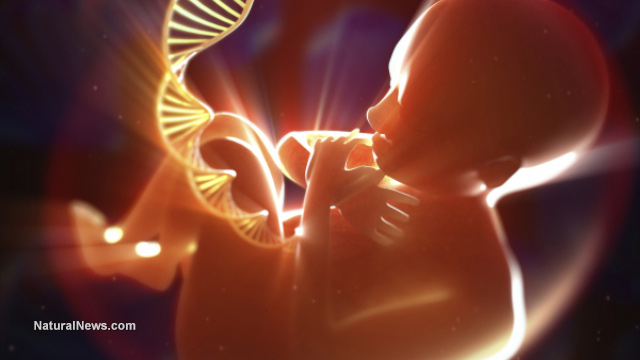Genetically modified children: Baby born with
DNA from three different people
Monday, October 03, 2016 by: David Gutierrez, staff writer
Tags: germline modification, biotech, three parents
Tags: germline modification, biotech, three parents
Facebook (509)
Twitter

three different people in an article in New Scientist. They will present the details of the new
procedure they used at the October meeting of the American Society for Reproductive
Medicine.
The procedure, which is illegal in the United States, was performed in Mexico.
It is not the first time that scientists have used biotechnology to produce a child with DNA from
The procedure, which is illegal in the United States, was performed in Mexico.
It is not the first time that scientists have used biotechnology to produce a child with DNA from
three separate people, but the researchers claim that their new technique is significantly more
precise, and has major implications for the prevention of genetic disease.
Preventing genetic disease
The fertility procedure was performed on a couple in which the woman was a carrier for a fatal
genetic disorder known as Leigh Syndrome. The syndrome is a progressive neurological
disorder that produces loss of movement and mental function, ending with death by early
childhood.
Because the woman carried the mutation in her mitochondria – the structures inside cells that
Because the woman carried the mutation in her mitochondria – the structures inside cells that
provide them with energy – any child she bore would contract and die from the disease. The
couple had already experienced four miscarriages and had two children die from Leigh
Syndrome, one at eight months and one at six years.
Mitochondria carry their own DNA, which is separate from the DNA found in the nucleus of the
Mitochondria carry their own DNA, which is separate from the DNA found in the nucleus of the
cell. This DNA is inherited only from the mother. Thus, a mitochondrial mutation will be passed
down to all of a woman's children.
Leigh Syndrome can be inherited via either mitochondrial or nuclear DNA.
In order to bypass the genetic death sentence, researchers used a new method in which an egg
Leigh Syndrome can be inherited via either mitochondrial or nuclear DNA.
In order to bypass the genetic death sentence, researchers used a new method in which an egg
cell was emptied of its mitochondria and its genetic material. That egg was then implanted with
nuclear DNA from the mother's egg, and healthy mitochondria from a donor egg. This new,
hybrid egg was then implanted with the father's sperm.
The researchers created five eggs by this new technique, but only one was viable. That one was
The researchers created five eggs by this new technique, but only one was viable. That one was
implanted and led to a viable pregnancy and live birth. An estimated 0.1 percent of the child's
DNA comes from the donor, and controls only the functioning of the mitochondria. All other DNA
comes from the two parents.
Many objections were the same as those cited by the FDA in 2002, when it banned a three-
What does the technology really mean?
The announcement drew praise from proponents of the technology, but also concern from critics.Many objections were the same as those cited by the FDA in 2002, when it banned a three-
person DNA technique known as cytoplasmic transfer. That technique was successfully used to
produce as many as 50 children before the FDA prohibited it, citing unaddressed concerns over
side effects and ethical implications.
Some of the children produced using cytoplasmic transfer were born lacking an X chromosome,
Some of the children produced using cytoplasmic transfer were born lacking an X chromosome,
and at least one showed signs of cognitive impairment.
Animal studies on newer mitochondrial replacement techniques suggest that they may carry
Animal studies on newer mitochondrial replacement techniques suggest that they may carry
some of the same risks. Researchers have seen cognitive impairment in mice and changes in
male fertility and ageing in insects.
"It is outrageous that they simply ignored the cautious approach of US regulators and went to
"It is outrageous that they simply ignored the cautious approach of US regulators and went to
Mexico, because they think they know better," said David King of the pro-choice group Human
Genetics Alert.
Another concern raised with such techniques is that they consist of germline modification – that
Another concern raised with such techniques is that they consist of germline modification – that
is, they make genetic changes that can be passed on to other generations. In a very real sense,
the safety implications of such techniques are unknowable until several generations have passed
Bioethics experts also warn that any germline modification can lead down the slippery slope to
"designer babies" and other ethically murky areas.
"Germ line therapy ... is something defined by the EU Charter of Fundamental Rights as
"Germ line therapy ... is something defined by the EU Charter of Fundamental Rights as
effectively constituting eugenics," says British MP Fiona Bruce, chair of the UK's All Party
Parliamentary Pro-Life Group.
The United Kingdom recently passed a law making it the only country on earth to explicitly
The United Kingdom recently passed a law making it the only country on earth to explicitly
permit three-person fertilization techniques.
Sources for this article include:
BBC.com
BBC.com
Science.NaturalNews.com
Sources for this article include:
BBC.com
BBC.com
Science.NaturalNews.com
Learn more: http://www.naturalnews.com/055512_germline_modification_biotech_three_parents.html#ixzz4M9AVviON

No comments:
Post a Comment